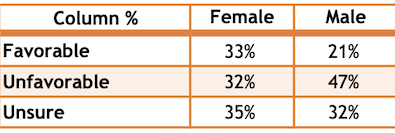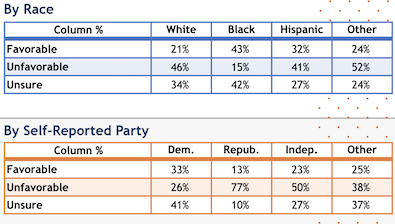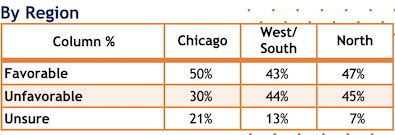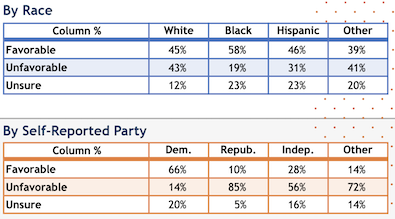|
Republicans, Democrats, And Independents Agree – NO ROFR In House Bill 3445
Tuesday, Oct 24, 2023 - Posted by Advertising Department [The following is a paid advertisement.] A statewide survey in Illinois shows that voters are overwhelmingly against the higher electricity costs that would result from “Right of First Refusal” (ROFR) legislation. Opposed to ROFR:
• 81% Democrats • 75% Independents Voters know that ROFR leads to higher electricity costs. As one woman told her representative on Facebook: “Kindly vote no for higher prices on electricity. We already are paying high prices on everything else!” ROFR is widely referred to as “crony capitalism” that kills competition, leading to rate hikes for consumers. ROFR has been found to be unconstitutional in some states – one reason why Illinois voters also believe passage would lead to wasteful spending on lawyers and lawsuits. The Illinois Commerce Commission explains the benefits of competition: “…competition among transmission developers spurs innovative results and helps control costs.” Transmission construction projects cost billions of dollars, and competition can deliver savings of 20-30%. Illinois ratepayers deserve affordable and reliable electricity. A vote for ROFR is a vote for higher electricity prices for consumers and a weaker grid. Vote NO on ROFR! See the survey results: https://www.fairenergyprices.org/il-rofr-survey
|
|
Afternoon roundup
Tuesday, Oct 24, 2023 - Posted by Rich Miller * All that turmoil for this? Sun-Times…
Oy. * “That kind of crowd”? WTTW…
* Maybe Chicago could forgive the water bill for this church…
* ABC 7…
* OK, let’s change topics. Press release…
Reaction from Dezaray Brookshire, State Government Director for Illinois Directors and Owners of Childcare Centers (ILDOCC)…
* Isabel’s roundup… * Tribune | Ald. Julia Ramirez issues statement ahead of meeting on potential migrant camp: ‘the mayor’s office did not consult with me’: “Additionally, to my frustration, the mayor’s office did not consult with me or my office about their current plans to construct a temporary shelter — meant to house 1,500 people — at 38th & California, nor did they inform my office that they would be sending work crews to conduct a site assessment last week,” she wrote. * Crain’s | When her house sells, she’ll donate the proceeds to help homeless people and migrants: Robin Potter is selling her Logan Square home of 43 years with an unusual plan for more than $600,000 in proceeds she’s likely to collect when the sale closes: She’ll donate the entire amount to programs that help migrants and those experiencing homelessness in Chicago. “There’s need on a grand scale in this city, with 18,000 migrants and 68,000 people homeless,” says Potter, a labor and employment attorney. “They’re struggling, and it’s our duty to help them.” * Tribune | 350 Horizon Therapeutics workers to be laid off, mostly from Deerfield offices, following acquisition by Amgen: As of late last year, Horizon had about 2,000 workers globally, including about 600 in its Deerfield offices, which were the company’s U.S. headquarters. Amgen acquired Horizon on Oct. 6 in a $27.8 billion deal. Amgen said in a statement that about 80% of Horizon’s workers will be placed into jobs at Amgen. The 350 who are being laid off are losing their jobs largely because of “overlap with existing teams at Amgen,” Amgen said in the statement. * WTTW | City Health Official Watchdog Said Should Be Fired for Role in Smokestack Implosion Promoted, Will Oversee Environmental Inspections and Enforcement: The full 94-page report from the Office of the Inspector General, first reported by WTTW News, urged Graham’s termination, saying evidence demonstrated he was responsible for the “abdication of responsibility and willful bureaucratic negligence” for issues including the failure to adequately soak the ground prior to the implosion, which was led by Hilco Redevelopment Partners. * WTTW | Cook County Prosecutors Won’t Charge Man Accused of Firing Gun Near Pro-Palestinian Rally in Skokie: Cook County State’s Attorney Kim Foxx’s office announced in a statement that after the office reviewed the events, it would not be filing charges against the man. “After reviewing the evidence, which includes surveillance video and witness statements, we have determined the individual, who holds a valid FOID card and Conceal Carry License and has no criminal history, acted in self-defense upon being surrounded by a crowd and attacked by some of those individuals,” Foxx’s office said. * Block Club | Bring Chicago Home Advocates Rally To Get Northwest Side Alderpeople On Board With Proposal: Members of 39th Ward Neighbors United, the Chicago Coalition for the Homeless and Communities United held a Monday rally at Ald. Samantha Nugent’s 39th Ward office, 4200 W. Lawrence Ave., to ask her to support the proposal. Over 50 people attended the rally, according to the sign-in sheet, said Mary Tarullo, associate director of policy and strategy at the coalition. * Beacon-News | Kane officials say new solar field will save the county $200,000 a year: The solar field will be owned, operated and maintained by Nelnet Renewable Energy. The county will purchase the power from Nelnet at a reduced rate. The project was developed by the Kane County Environmental and Water Resources Department and members of the Kane County Board Energy and Environmental Committee. * Daily Herald | $159 million redevelopment project at old Lombard seminary in jeopardy? Developer looking at options: Nearly three years ago, a suburban developer laid out an ambitious plan for a former seminary campus next to Lombard’s Yorktown Center mall. […] The mixed-use project, however, still hasn’t gotten off the ground. The Schaumburg-based development group is looking at their options, including taking on a partner to pursue the original plan, village officials say. * Crain’s | MacKenzie Scott breaks donation record at another Chicago nonprofit: Billionaire philanthropist MacKenzie Scott donated $8 million to Cara Collective, a Chicago-based workforce development organization. The gift is its largest donation ever, the nonprofit said. This is the latest donation to a Chicago-area nonprofit by Scott, who has donated more than $270 million to Chicago-based locations over the past few years. * WAND | Owner of Macon Speedway plans to sell: According to the post, Kearns purchased Macon Speedway with the intention of running it with his family but medical issues have made it difficult. Kearns said that if the speedway does not sell in the off season to the right person, he and his son will continue to run it in 2024. The 2023 banquet to honor racers is still slated to continue. * San Francisco | California DMV suspends Cruise’s driverless taxis in S.F., citing safety concerns: The DMV, one of the state’s regulators for self-driving cars, said there is no set timeline for the suspension. At this time, the DMV says the suspension of Cruise’s driverless ops is based on the determination that “the manufacturer’s vehicles are not safe for the public’s operation.” * NBC | Tesla says Justice Department is expanding investigations and issuing subpoenas for information: The additional investigation topics and the subpoenas suggest that prosecutors have broadened their inquiry, and they have found the need to force Tesla to disclose information, legal experts say. The filing indicates prosecutors may be investigating Tesla CEO Elon Musk, and whether the company has been candid in describing the features of its vehicles, they say. * Block Club | Enjoy The 80-Degree Weather — It’ll Be In The 40s By Next Week: “There’s basically a lot of strong, southerly and southwesterly wind, which is pumping a lot of warmer air into the area from the southern plains and the Gulf Coast,” he said. “That’s allowed us to warm up.” Warmer weather in the high 60s and low 70s is expected through the end of the week, though rain is also part of the forecast. By the weekend, temperatures will drop into the 40s and 50s as a cold front passes through the area, Yack said.
|
|
Question of the day
Tuesday, Oct 24, 2023 - Posted by Rich Miller * In its ongoing series about anti-government extremists infiltrating law enforcement ranks, WBEZ, the Sun-Times and the Organized Crime and Corruption Reporting Project published a story entitled “He was a rising football star — then he met this state trooper.” You should read the whole thing to see what happened to the kid, but let’s talk about this…
The Oath Keepers list was made public in September of 2022. * One issue not mentioned in the story is that the Illinois State Police Merit Board is specifically prohibited from investigating most actions that took place more than three years before a complaint is filed. So even if a complaint was filed against that trooper, the board couldn’t do anything about conduct in 2009 through 2015, when he was listed as an Oath Keepers member. Here’s the rule…
The State Police Merit Board proposed getting rid of this rule in May of 2022, with the support of the ISP. Click here and scroll down to see it. However, I’m told, the legislature’s Joint Committee on Administrative Rules asked the Merit Board to withdraw the proposed change due to lack of support among its bipartisan membership and opposition from police unions. * The Question: Should this statute of limitations-style rule be rescinded, extended or left as-is? Make sure to explain your answer, please. Thanks. …Adding… JCAR staff recalls this differently. They’re saying that JCAR took a pass because they learned an unfair labor practice charge was pending before the Illinois Labor Relations Board on this very issue, not on the policy per se.
|
|
Hard-right House Republicans reject Invest in Kids Act compromise
Tuesday, Oct 24, 2023 - Posted by Rich Miller * I don’t think I’ve ever done this before, but take a look at the ad below by the Invest in Kids Act proponents for background if you need it. From the Illinois Freedom Caucus…
All or nothing, apparently. Same as it ever was. But that, as they say, appears to be the ballgame.
|
|
Raoul, other attorneys general file lawsuit against Meta
Tuesday, Oct 24, 2023 - Posted by Rich Miller * CNBC…
The lawsuit is here. * From AG Raoul…
…Adding… Sen. Rezin…
|
|
Even after numerous push questions, GOP pollster finds Durkin still only at 40 percent who would consider supporting him
Tuesday, Oct 24, 2023 - Posted by Rich Miller * The wording here is kinda hilarious. To be clear, any Republican would have “support” against a Democrat in Cook County…
The result is obtained after asking eleven questions, including blatant push questions about how Durkin is “tough on crime,” how he’d created a “multi-prong plan” to address crime, how he voted for the assault weapons ban and how he’d been given the “Defender of the Innocent” award, along with other questions about Kim Foxx, etc. Also, the final question is misquoted by the above media outlet. The pollster doesn’t ask if respondents would “vote” for Durkin, it asks if they would “consider supporting a reform Republican like Jim Durkin to represent you as your Cook County district attorney” [sic]… Yes 40 percent Man. That is one heckuva snowjob. I have always loved me some Jim Durkin, but c’mon, man. * Let’s move on to Mayor Brandon Johnson’s favorables…  Keep in mind that this is a county-wide poll, so the Chicago-only numbers have a significantly higher margin of error. Even so, not great. More county-wide Mayor Johnson fave/unfaves, which might be useful when thinking about suburban legislative candidates…   * President Biden…   Coefficient was Gary Rabine’s pollster.
|
|
The CCS Opportunity In Illinois
Tuesday, Oct 24, 2023 - Posted by Advertising Department [The following is a paid advertisement.] Carbon capture and storage, or “CCS,” is a technology that captures carbon dioxide (CO2) emissions at their source and stores them deep underground. CCS is a proven and safe process and the Illinois State Geologic Survey has confirmed that our state’s geology is perfectly suited for this technology. The Pipeline and Hazardous Materials Safety Administration (PHMSA) enforces federal requirements to regulate the safety of the pipelines that will support CCS. In addition to delivering a cleaner environment, CCS will generate $3.3 billion in value for the region and could spur 14,440 jobs. Now is the time to bring carbon capture technology and its environmental and economic benefits to Illinois. Policymakers must pass legislation to advance CCS and bring this opportunity to Illinois.
|
|
Bruce Simon
Tuesday, Oct 24, 2023 - Posted by Rich Miller * Bruce Simon was truly one of the nicest people I’ve ever known. He was a kind man. He was also an effective, highly knowledgeable lobbyist. Bruce was a great White Sox fan and often hosted charitable and other events at the park. Bruce passed away last night. This world just won’t be the same without him. * From Comptroller Susana Mendoza…
* RIP… 
|
|
Today’s quotable
Tuesday, Oct 24, 2023 - Posted by Rich Miller * Former WLS Radio host Big John Howell writing in the Sun-Times…
|
|
Here’s How To Make The Tax Credit Scholarship Better
Tuesday, Oct 24, 2023 - Posted by Advertising Department [The following is a paid advertisement.] We’ve been listening carefully to the governor, legislative leaders, and many members of the legislature about how to make the Tax Credit Scholarship better – and we now have an amended program proposal that does exactly that. Thousands of vulnerable kids are counting on us to put them before politics. In response to direct feedback, our bill offers substantive improvements along with good-faith compromises which justify extending the Tax Credit Scholarship Program:
2. Reduce the overall size of the program to $50MM (down from $75MM) and reduce the individual giving cap to $500,000 (down from $1MM). 3. Reduce the tax credit for donors to 55% (down from 75%). 4. Encourage more middle-income donors by crediting donations of up to $5,000 with a 100% tax credit. Illinois, let’s do the right thing. It’s about the kids, not the politics. Save the scholarships.
|
|
Protected: SUBSCRIBERS ONLY - Today’s edition of Capitol Fax (use all CAPS in password)
Tuesday, Oct 24, 2023 - Posted by Rich Miller
|
|
Open thread
Tuesday, Oct 24, 2023 - Posted by Isabel Miller * We’re back in Springfield for the first day of veto session! What’s going on in your part of Illinois?…
|
|
Isabel’s morning briefing
Tuesday, Oct 24, 2023 - Posted by Isabel Miller * ICYMI: Veto session begins today. AP…
- Sen. Sue Rezin said she has enough support to overcome the veto on her bill to lift the Illinois nuclear moratorium for small reactors. - Vetoed legislation that aims to protect employees from getting fired over a discrepancy in their name or social security number may get the governors signature if drafting errors get corrected. * Related stories… ∙ WGEM: Nuclear power plants on agenda as Illinois veto session begins Tuesday ∙ Center Square: Illinois lawmakers plan to address several issues during the fall veto session ∙ 21st Show: Preview of the 2023 Veto Session ∙ WGN: State lawmakers return to Springfield Tuesday for fall veto session ∙ Scott Holland: Lawmakers will decide if tax break program can continue * Isabel’s top picks… * Sun-Times | Pritzker urges residents to unite ‘across religions, across ethnicities to renounce hatred’: “We stand here united across religions, across ethnicities to renounce hatred. To show our Muslim and Jewish neighbors that we stand with them, and to chart a new course of solidarity, justice and humanity,” Pritzker said. * WBEZ | He was a rising football star — then he met this state trooper: One evening in 2018, Dumais came looking for Mitchell’s brother at the family’s home on a cul-de-sac in south suburban Matteson. Dumais and another officer apprehended Mitchell instead, forcing him into a squad car before realizing their mistake and letting him go. In that incident, though, the police injured Mitchell’s right knee badly, and he says he never completely recovered his blazing speed, which at the time threatened his hopes of success as a Division I football player. Governor Pritzker will be announcing a new early childhood initiative at 10:30 am today. Click here to watch. * Here’s the rest of your morning roundup… * NBC Chicago | Illinois tech hubs to focus on crop production, quantum computing, White House says: According to the Biden Administration, hubs based in Chicago and Champaign were among 31 projects tabbed to receive funding through the program. […] According to a press release from the White House, up to $10 billion in funding is available through a bill, passed in 2022, that aimed to help address shortages in semiconductor manufacturing and supply chains, along with other tech-related issues in the U.S. * Patch | Burr Ridge Mayor Not Running For State House: Burr Ridge Mayor Gary Grasso said Monday he would not run for state representative in the 82nd House District. * Sun-Times | No charges for man who fired gun in the air near pro-Palestinian protesters in Skokie: The 39-year-old man, who prosecutors declined to name, was released from police custody. In a statement issued Monday, prosecutors said the man, a Firearm Owner Identification Card and Concealed Carry License holder, had “no criminal history.” “After reviewing the evidence, which includes surveillance video and witness statements, we have determined the individual … acted in self-defense upon being surrounded by a crowd and attacked by some of those individuals,” according to the statement. * Sun-Times | Over protests, city officials confirm Brighton Park tent plan, pending final ‘assessments’: “The City of Chicago has been identifying viable sites across the city to construct base camps as an alternative to new arrivals sleeping outdoors, at O’Hare and on the floors of police district stations as winter fast approaches,” the statement from the mayor’s office reads. “The site at 38th and California appears viable, and the intention is to construct temporary shelter at this site.” * WTTW | Johnson Asks City Council to Reject Part of Deal He Inked with Police Union Amid Uproar Over Discipline Change: “While we recognize police officers’ right to arbitration, it is crucial that disciplinary cases be handled in a manner that allows for public transparency and true accountability,” Johnson said. “Since this is a matter that will require City Council action, I am asking the body to reject this measure when it comes up in the coming weeks.” * Crain’s | What’s in store as the City Council gets set to scrutinize Johnson’s nearly $2B police budget: In Johnson’s $16.6 billion proposal, the CPD budget is increased roughly $91 million, from $1.907 million to $1.998 billion. The increase follows through on Johnson’s pledge to not take “one cent” from the department. * WTTW | Chicago Program That Encourages Drug Treatment Over Arrest Shows Signs of Success, Research Says: But the program is only available to about 5% of all drug offenders. Only those who have not been convicted of a crime in 10 years and are deemed to pose no threat to the public are eligible.’ According to city statistics, 700 people have gone through the program since 2018. * Illinois Times | City disburses $3 million grant to address homelessness: The grants will expand on the “co-responder” model the department has employed since 2019 in which police work in conjunction with mental health professionals to assist the homeless, Deputy Police Chief Joshua Stuenkel said. Comprehensive services also will reduce the number of trips police make to bring people to the Sangamon County Jail and Springfield hospital emergency rooms, said Mike Newman, the police department’s homeless outreach team coordinator. * Chalkbeat | New federal program puts $12 million toward school integration in a dozen states: Among the winners are some of the largest districts in the country, including New York City and Chicago, where debates have long raged over how to address the inequities wrought by school segregation. Other winners include a cohort of Maryland districts and the East Baton Rouge Parish in Louisiana, both of which have been home to intense battles over school segregation in recent years. * AP | UAW’s confrontational leader makes gains in strike talks, but some wonder: Has he reached too far?: People with personal ties to Fain say his approach, on the picket lines and at the bargaining table, reflects the bluntly straightforward manner he developed as he rose through the union’s ranks. He is, they say, the right man for the moment. People with personal ties to Fain say his approach, on the picket lines and at the bargaining table, reflects the bluntly straightforward manner he developed as he rose through the union’s ranks. He is, they say, the right man for the moment. * NYT | Two Illinois Parishes Live on Either Side of a Catholic Divide: When the Rev. John Trout heard that Pope Francis wanted feedback from parishes before a major Vatican gathering this month on the church’s future, he decided that his suburban Chicago congregation would go all in. […] Less than an hour south of St. Joe’s, the Rev. Anthony Buś of St. Stanislaus Kostka Parish in Chicago said he viewed the gathering in Rome not as an opportunity but as a potential threat, or at the very least an irrelevance. * WAND | Effingham Co. Coroner releases final report on deadly Teutopolis HAZMAT crash: Final an official autopsy reports were released for the five people who died from respiratory failure due to inhalation and exposure to anhydrous ammonia. This included severe chemical burns to the entire body, respiratory system, face, eyes, and lungs.
|













